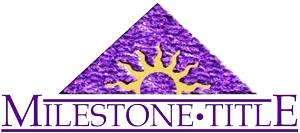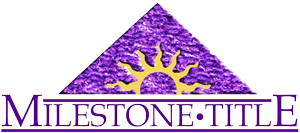Milestone Title
Excellence in Every Transaction
Experience the gold standard in title services. With over 20 years serving the Washington, DC Metropolitan area, we stand as the foremost expert in real estate title insurance related matters.

Our expertise ensures your peace of mind.
A LEGACY OF EXPERTISE: 20 YEARS STRONG
At Milestone Title, we understand the intricacies and significance of marketable title. Every property owner recognizes the value of a marketable title, and it's our mission to ensure that every milestone in your property journey stands clear and uncontested.


Precision at Every Milestone
For us at Milestone Title, precision isn't just a standard—it's a commitment. Each transaction, document, and detail undergoes rigorous scrutiny. With cutting-edge technology and industry experience, we affirm that every title process you entrust to us is managed with the highest degree of accuracy.

Diligence & Communication in Every Step
We're well aware of the stresses that property transactions can bring. This is why we're not just diligent; we're proactive. Each document, each title report, and every piece of data is reviewed with an unmatched attention to detail. It's this diligence and our communication with our clients that ensures you're not just getting a service; you're getting a promise of security.

Why Milestone Title?
More than just precision and diligence, Milestone Title stands for trust, integrity, and excellence. Our in-depth understanding of the local real estate market means we’re always prepared, always ahead of potential hurdles, ensuring smooth transactions for all of our clients.
For an unparalleled real property transaction experience, where precision meets diligence at every milestone, trust in Milestone Title. Your clear title journey begins here!
Streamlining Your Real Estate Journey
Expert Solutions for Every Step of Your Property Transaction
Title Insurance
Secure your property rights with our comprehensive title insurance plans. Designed to protect you from unforeseen title disputes and provide peace of mind.
Settlement Services
Experience seamless closing processes with our expert settlement services. Handling all the details, from document preparation to finalizing transactions.
Deed Preparation Services
The attorneys at C.M. O'Neal & Company, PC are experienced in various types of Deed Preparations.
Escrow Services
Our trusted escrow services safeguard your transaction, managing funds and documents with integrity until all conditions are met.
Ready to Navigate Your Real Estate Transaction with Confidence?
Get expert guidance tailored to your unique needs. Our consultations provide clear insights and solutions for your real estate objectives.
Who We Serve
Empowering a Diverse Range of Clients in Their Real Estate Ventures
Lenders
Milestone Title is the professional partner you need! With open lines of communication, we are your best choice for closing and title services.
First-Time Homebuyers
Navigating your first home purchase? We specialize in guiding first-time buyers through the complexities of the transaction. We educate on title insurance and the process, ensuring a smooth and understandable process.
Real Estate Investors
For seasoned investors and those new to real estate investing, we provide robust title and escrow services that protect your investments and streamline your transactions.
Residential and Commercial Realtors
Partnering with realtors to ensure seamless transactions for their clients. Our services complement your work, offering peace of mind and efficient closings.

Property Developers
Supporting developers with comprehensive title services for large-scale projects. We handle complex transactions, ensuring legal compliance and efficiency.
Legal and Financial Advisors
Collaborating with legal and financial professionals to provide specialized title and escrow services for their clients, ensuring all legal and financial aspects are meticulously managed.
Refinancing Homeowners
Assisting homeowners in the refinancing process with streamlined title services, helping to secure better mortgage terms and protect their property rights.
For Sale By Owner (FSBO)
No real estate agents, no problem. Affordable contract preparation by a licensed attorney and referrals for appraisers, lenders and more. We will handle the process from start to finish and prepare all documents needed.
Explore our services and discover how Milestone Title is redefining precision in real estate settlement transactions.
What is Title Insurance?
If you’re buying a home, title insurance is a policy that protects your investment and your property rights. If a claim is made against your property, title insurance will, in accordance with the terms of your policy, assure you of a legal defense and pay all court costs and related fees.
Why do I need Title Insurance?
Purchasing owner’s title insurance is a smart decision because it’s the best way to protect your property from future legal claims. Milestone Title strives to resolve all known title defects to your property prior to closing.
What can I expect at the closing stage with Milestone Title?
Closing typically occurs within 30 to 90 days from the accepted offer. With Milestone Title, you can expect a smooth and meticulous process handled by experienced professionals. From contract signing to title transfer, we guide you every step of the way.
Meet the Team at Milestone Title
Behind every successful title process at Milestone Title, there's a team of dedicated professionals committed to excellence. Our team is more than just experienced; they are passionate about ensuring that every detail of your real estate transaction is handled with meticulous care. With a blend of industry veterans and innovative thinkers, we provide a personalized approach to settlement process.
Get to know the individuals who make your property journey smooth and secure. Welcome to the Milestone Title family.

Cerissa M. O’Neal, Esq.
Founder/CEO
Cerissa M. O’Neal, Esq.
With over 24 years of legal real estate experience, Cerissa has dedicated herself to the empowerment and success of her clients. She founded Milestone Title in 2004 with the determination to serve residents and real estate professionals with the commitment, respect, competence and care she desired for herself and others. Since that time, Cerissa has grown Milestone Title to be one of the most in demand title and escrow companies in the Washington, DC region, the District of Columbia, and the state of Maryland. Whether her client is a first-time home buyer, a seasoned real estate agent or a savvy commercial investor, Cerissa provides excellent, trusted, and valued services with a compassionate tone unrivaled in the industry.


Jackie L. O’Neal
Co-Owner, Office Manager & Pre-Processor
Jackie L. O’Neal
As an accomplished professional with over 30 years of management experience, and a United States Military Veteran, Jackie is proud to be of service to the clients and interests of Milestone Title. Jackie joined her daughter, Cerissa O’Neal, in 2006 to help grow Milestone Title to the preferred title and escrow company it is today. Jackie’s wealth of knowledge as a Licensed Title Insurance Producer and her experience at Milestone Title allows her the vision and expertise to execute all duties and functions needed to seamlessly and professionally manage the day-to-day operations of the company.

Terrye Jackson
Senior Processor
Radhika Khanna
Processor
Regina Blakeney
Post-Closer

Michael Newman, II
TIPIC

Snyder Jean
TIPIC
Angelena Balram
TIPIC
Our Milestone Title Promise
Milestone Title promises to provide all of our customers with an expert experience carried out by the friendliest, most flexible team in the business. The relationships we forge with our clients and real estate partners extend well beyond our closing table.
Client Testimonials
"I just wanted to say thanks for the professionalism and care that was extended to me during my closing process. I really appreciate the time you all took to answer my questions and make me feel comfortable through the entire process. I will definitely recommend you to others."
Kerry Jones
Senior UXO Supervisor, U.S. Government
"Milestone Title handled our wire disbursement with remarkable efficiency and care. Their timely and professional service turned us from clients into advocates. We trust them wholeheartedly."
Laurence Richardson
Managing Director, Commercial Lending Group LLC.
Experience Excellence with Milestone Title today.
Contact us to work together on your next deal.
Why Title Insurance?
Title insurance is a crucial aspect that often goes unnoticed but plays an essential role in protecting your property rights.
From guarding against legal claims to ensuring a smooth transaction, title insurance provides a shield of security for both property owners and lenders. Here's why title insurance from Milestone Title is not just an option, but a necessity for your real estate journey:
Protection Against Claims
Mitigates Hidden Risks
Confirms Ownership Rights
One-time Investment
Streamlines Transactions
Ready to secure your property investment? Contact us today for a FREE consultation, and let Milestone Title guide you through the importance of title insurance tailored to your needs.
Additional Questions
Office: Largo, MD 20774
Call 301-459-0400
Email: info@milestonetitlellc.com
Site: www.milestonetitlellc.com

